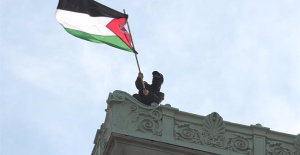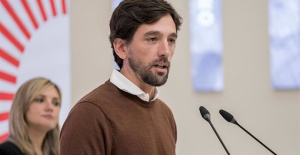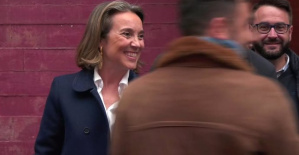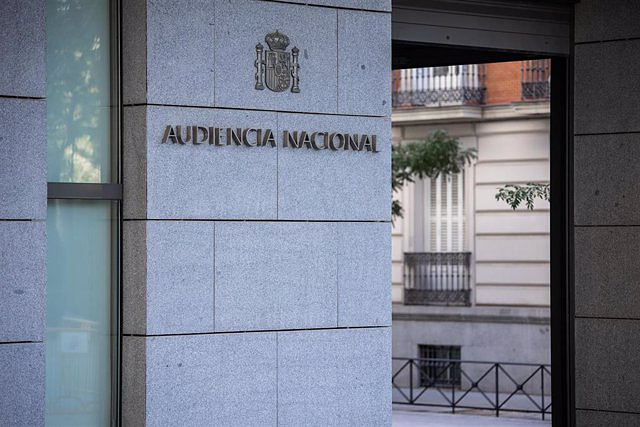Observes "advance" in forgiveness to victims but insufficient and recommends restorative justice program
MADRID, 28 Feb. (EUROPA PRESS) -
The prison surveillance judge has revoked the third degree granted by the Basque Government to ETA member Juan Carlos Subijana, considering that it is premature because, although he observes a "progress" in the way of asking for forgiveness from his victims, he believes, in line with the Ministry Prosecutor, who in some way continues to "politically" legitimize terrorist activity, which is why he also recommends that I participate in a restorative justice program."
This is stated in an order dated February 22, to which Europa Press has had access, where Judge María Reyes Jimeno estimates the appeal filed by the Prosecutor's Office against the agreement adopted on August 11 by the Basque Government's Vice-Ministry of Justice by which he agreed to Subijana's progression to third grade.
The magistrate recalls that "he is convicted of a very serious crime (murder) and a crime of damages to a total of 28 years in prison, he still has a long period of serving the imposed sentence pending, since he has not served three-quarters, which will not expire until 2028, and final compliance is not foreseen until the year 2035, for which 12 years of compliance are missing".
In addition, it alludes to the two letters made by Subijana, the most recent on October 30, to apologize to the victims of his terrorist actions, assessing that they represent "an important treatment advance" because they do not respond "to the stereotyped writing scheme and ambiguous" of the ETA prisoners, given that in his case "he specifically mentions his victim and family members".
However, it accepts the arguments of the Public Prosecutor's Office, which observes that "certain expressions that he uses in his brief denote a lack of sufficient overcoming of the aspects discussed that makes it necessary to continue working on the deficits that led the inmate to commit a crime."
"Obtaining permits is not a point of arrival, but a transcendent moment of a behavioral evolution that culminates in the third degree," underlines the Public Ministry in its report, cited by the prison surveillance judge.
Specifically, the Prosecutor's Office indicates that "the document provided contains a reference to 'violence to achieve political objectives', which politically legitimizes terrorist activity"; that "the mention of the 'organization in which he was a member' clearly obviates its definition as a terrorist organization"; and that he speaks of "terrorist activity as 'armed struggle'".
The Prosecutor's Office also perceives "a certain equidistance in its reference to 'all the victims'", all of which would reveal "that the foundations of their criminal acts have not been sufficiently addressed and modified to date."
The magistrate also points out as a negative factor in this context that "there is no record of the participation of the prisoner in restorative justice programs that can corroborate the sincerity of the repentance and contrast the favorable evolution that has been pointing out."
To this he adds that "the proposal of the Treatment Board is not unanimous but majority"; the "recent start of enjoying ordinary exit permits in April 2022"; and that, "although he is paying the civil liability imposed, the payment at the time of the contested degree review was very low in proportion to the amount owed (...), as reflected in the proposal of the Treatment Board itself and that consigns the payment of 210 euros".
The judge takes advantage of the Subijana case to recall that "progression to the third degree is nothing more than the relationship between the normal mechanisms for controlling the progress of the inmate in the ordinary regime or second degree, granting him a wider space of freedom, which obviously it should not be done if it is not with a certain guarantee of success in the use of that margin of confidence and a reasonable prospect of not misusing it".

 Exploring Cardano: Inner Workings and Advantages of this Cryptocurrency
Exploring Cardano: Inner Workings and Advantages of this Cryptocurrency Seville.- Economy.- Innova.- STSA inaugurates its new painting and sealing hangar in San Pablo, for 18 million
Seville.- Economy.- Innova.- STSA inaugurates its new painting and sealing hangar in San Pablo, for 18 million Innova.- More than 300 volunteers join the Andalucía Compromiso Digital network in one month to facilitate access to ICT
Innova.- More than 300 volunteers join the Andalucía Compromiso Digital network in one month to facilitate access to ICT Innova.-AMP.- Ayesa acquires 51% of Sadiel, which will create new technological engineering products and expand markets
Innova.-AMP.- Ayesa acquires 51% of Sadiel, which will create new technological engineering products and expand markets US Police storm Columbia University and arrest more than a hundred pro-Palestinian protesters
US Police storm Columbia University and arrest more than a hundred pro-Palestinian protesters The PP incorporates the former general secretary of Ciudadanos Adrián Vázquez in its list for the European elections
The PP incorporates the former general secretary of Ciudadanos Adrián Vázquez in its list for the European elections Gamarra (PP) accuses Sánchez of "an exercise in democratic degeneration" to "avoid being controlled by counterpowers"
Gamarra (PP) accuses Sánchez of "an exercise in democratic degeneration" to "avoid being controlled by counterpowers" The May 1 demonstration for full employment begins in Madrid
The May 1 demonstration for full employment begins in Madrid How Blockchain in being used to shape the future
How Blockchain in being used to shape the future Not just BTC and ETH: Here Are Some More Interesting Coins Worth Focusing on
Not just BTC and ETH: Here Are Some More Interesting Coins Worth Focusing on Ivace and promotes a less invasive device for the early detection of prostate cancer
Ivace and promotes a less invasive device for the early detection of prostate cancer Valencia unanimously approves the ordinance to allocate spaces to test innovative initiatives
Valencia unanimously approves the ordinance to allocate spaces to test innovative initiatives UPV researchers promote a paid master's degree as a "talent factory" in integrated photonics
UPV researchers promote a paid master's degree as a "talent factory" in integrated photonics A spin-off of the UV works on obtaining high-resolution 3D biomedical images in real time
A spin-off of the UV works on obtaining high-resolution 3D biomedical images in real time A million people demonstrate in France against Macron's pension reform
A million people demonstrate in France against Macron's pension reform Russia launches several missiles against "critical infrastructure" in the city of Zaporizhia
Russia launches several missiles against "critical infrastructure" in the city of Zaporizhia A "procession" remembers the dead of the Calabria shipwreck as bodies continue to wash up on the shore
A "procession" remembers the dead of the Calabria shipwreck as bodies continue to wash up on the shore Prison sentences handed down for three prominent Hong Kong pro-democracy activists
Prison sentences handed down for three prominent Hong Kong pro-democracy activists ETH continues to leave trading platforms, Ethereum balance on exchanges lowest in 3 years
ETH continues to leave trading platforms, Ethereum balance on exchanges lowest in 3 years Investors invest $450 million in Consensys, Ethereum incubator now valued at $7 billion
Investors invest $450 million in Consensys, Ethereum incubator now valued at $7 billion Alchemy Integrates Ethereum L2 Product Starknet to Enhance Web3 Scalability at a Price 100x Lower Than L1 Fees
Alchemy Integrates Ethereum L2 Product Starknet to Enhance Web3 Scalability at a Price 100x Lower Than L1 Fees Mining Report: Bitcoin's Electricity Consumption Declines by 25% in Q1 2022
Mining Report: Bitcoin's Electricity Consumption Declines by 25% in Q1 2022 Oil-to-Bitcoin Mining Firm Crusoe Energy Systems Raised $505 Million
Oil-to-Bitcoin Mining Firm Crusoe Energy Systems Raised $505 Million Microbt reveals the latest Bitcoin mining rigs -- Machines produce up to 126 TH/s with custom 5nm chip design
Microbt reveals the latest Bitcoin mining rigs -- Machines produce up to 126 TH/s with custom 5nm chip design Bitcoin's Mining Difficulty Hits a Lifetime High, With More Than 90% of BTC Supply Issued
Bitcoin's Mining Difficulty Hits a Lifetime High, With More Than 90% of BTC Supply Issued The Biggest Movers are Near, EOS, and RUNE during Friday's Selloff
The Biggest Movers are Near, EOS, and RUNE during Friday's Selloff Global Markets Spooked by a Hawkish Fed and Covid, Stocks and Crypto Gain After Musk Buys Twitter
Global Markets Spooked by a Hawkish Fed and Covid, Stocks and Crypto Gain After Musk Buys Twitter Bitso to offset carbon emissions from the Trading Platform's ERC20, ETH, and BTC Transactions
Bitso to offset carbon emissions from the Trading Platform's ERC20, ETH, and BTC Transactions Draftkings Announces 2022 College Hoops NFT Selection for March Madness
Draftkings Announces 2022 College Hoops NFT Selection for March Madness



























